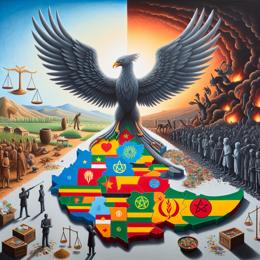Image created by AI
South Africa’s Crusade Against Corruption: Calls for Radical Strategy and Enhancements in Judicial Efficiency
The persistent cloud of corruption that looms over South Africa has been recognized as an existential threat to its democracy and economic viability. In what is seen by many as a national crisis, corruption has insidiously permeated various sectors of society with criminal networks operating almost undeterred. Despite expectations that Jacob Zuma's departure would curtail corrupt practices, the malady requires more drastic measures to be effectively remediated.
A stark analysis shows that the country must overhaul its approach to combat corruption—not with piecemeal reforms, but with a robust and comprehensive strategy that synergizes the judiciary, law enforcement agencies, government entities, and civil society. The current National Anti-Corruption Strategy, despite being in the pipeline for years, lacks the imperative of tangible, swift enactment. It's not enough to expect marginal improvements to challenge the status quo; instead, a sharp, high-impact methodology—"Radical Anti-Corruption Strategy"—is essential, focusing specifically on:
• Fortifying the South African Revenue Service (SARS) by enlisting a cadre of adept professionals within a unit specializing in high-risk inquiries. Such reinforcement will enable SARS to decimate organized crime syndicates leveraging governance weaknesses.
• Establishing dedicated corruption courts could prove a decisive move. Specialization would facilitate rapid adjudication, demonstrating an unequivocal intolerance of corruption, and uplifting the efficiency of legal proceedings with experts at the helm.
• Reinforcing the National Prosecuting Authority (NPA) is indispensable. The recent integration of seasoned legal professionals within the NPA has been commendable, although the entity remains in dire need of additional resources and guaranteed operational autonomy to pursue corruption cases with due vigor.
• Adoption of a multi-agency strategy fosters synergistic efforts among various institutions, combating the compartmentalization of anti-corruption endeavors, and cornering corrupt operatives across the spectrum of government and private sectors.
• Enhancing the capabilities of the Public Protector's office and the Auditor-General to tackle mismanagement and illicit activity in state procurement while implementing reforms to curb cronyism in government institutional boards.
The aforementioned facets of the campaign against corruption are cornerstones, but they cannot stand without the mortar of political determination and accountability. President Cyril Ramaphosa's term rocketed with potential for this battle, and with the country heading into a new paradigm of multiparty governance in his seventh administration, the opportunity for comprehensive anti-corruption measures is beckoning.
To deploy such a radical anti-corruption initiative, South Africa may need to invest significantly—estimates range from R6-billion to R10-billion annually. However, the dividends, both financial and societal, promise to exceed this outlay substantially. South Africa now stands at a pivotal juncture: Will it muster the resolve to take tangible, immediate action, or will it crumble under the inertia of apathy and lose its democratic essence? Certainly, strides have been made globally in eradicating corruption and these lessons should inform the country as it cannot flounder without the requisite political will. The country's journey towards a transparent, accountable democracy, where the scourge of corruption is extinguished, is imperative and must be embarked upon with vigor and urgency.










